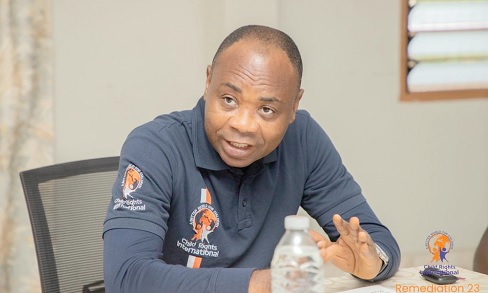The ideals which the framers of the Constitution were at pains by the letter and spirit of this Constitution to establish ought to be respected and adhered to.
They are justice and fair play; abhorrence of arbitrariness and discrimination; victimisation and vindictiveness; the protection of the individual and his fundamental human right within the walls of the Constitution - Tujfuorv. Attorney-General [1980] G.L.R 637
The law is a fortress for the voiceless in society, and the vindication of the decision of a court in dispensing justice lies in the womb of time.
In 2021, but for the court's decision, Tyron Iras Marghuy would have been denied admission to Achimota Senior High School ("School"), when he was required to choose between keeping his dreadlocks for religious purposes or cutting them as a precondition to enrol in the school.
Today, Tyron has successfully graduated from the school scoring Grade A in all subjects in the 2023 W ASSCE under the free SHS programme.
On March 31, 2021, Tyron, then 17 years, sued the School and the Attorney-General in the High Court (Human Rights Division), Accra for the School's breach of his fundamental human rights.
Tyron sat for the Basic Education Certificate Examination (BECE) as student of The Lord Shines International School and Omega School.
He obtained Aggregate Six and he was placed at the Achimota High School.
On arrival at the school, he was isolated because of his hair and further required to cut his dreadlocks as a condition precedent for enrolling in the School.
With the support offered by Child Rights International, Tyron, acting through his next friend and guardian, sued.
Principally, Tyron sought redress for the breach of his right not to be deprived of education by reason of only religious and other beliefs; freedom to practice any religion and to manifest such practice; right to human dignity; and right against discrimination.
Court Case
The case was such that it required expeditious trial.
This was because first, it involved a child and secondly, his education was at stake.
The trial judge rightly exercised its discretion in abridging the time for the hearing, following which she found for Tyron.
The Court held that the refusal or failure of the school to admit or enrol Tyron on the basis of his Rastafarian religious inclination, beliefs, and culture characterised by his keeping of rasta is a violation of Tyro n's rights under articles 12(1 ); 23; 21(1 )(b) and (c); 26(1 ); 17(2); and (3); 25(1)(b) and 28(4).
The Tyron Case followed the principle established in the case of James Kwabena Bomfe Jnr.
v. Attonery-Genera/, Writ No. Jl/14/2017, on January 23, 2019, where the Supreme Court upheld the constitutionally guaranteed right to religion and the manifestation of religious practices.
The Court held that: The combined effect of the letter and spirit of these provisions [articles 17, 21(1) (b) (c), 35(1) (5) (6) (a), 37(1), 56] guarantees the fundamental freedoms of the citizen including the right to practice any religion and to manifest such practice.
By the letter and spirit of these provisions religious pluralism and diversity which are features of a secular state are clearly recognised and thereby discrimination on any ground is prohibited.
Justice Addo
The trial judge, Justice Gifty Agyei Addo, stated as follows: Religious intolerance is undemocratic.
Any state that fails to tolerate the practice and manifestation of religions of its citizens and people within the state portends a serious anarchy in the state.
Therefore, any attempt to project a rule or regulation to a character that expediently frowns upon the manifestation of a person's religion without reasonable grounds, must be frowned upon in our democracy.
The said rule must therefore be construed with the necessarysubjection to the 1992 Constitution.
I reject the argument of the Respondents that this finding will amount to discriminating against the other students of the school who apparently have conformed to the rule without complaint.
Rather, I hold the view that rules and regulations of the school should only be viewed in the lens of the provisions of the Constitution to ensure that they do not sin against people's rights to manifest and practise any religion they subscribe to, except on reasonable justification for the public good, in this case the community of students.”
The case also establishes the principles that school rules must conform with the laws of Ghana.
The decision is of immense significance to the educational rights of all school going children.
Tyron in school
Tyron has lived up to expectations.
He lived peacefully with all other students and studied in the school without any record of disciplinary action taken against him for one misconduct or the other.
He showed great respect to all his teachers, fellow students, and non-teaching staff.
He took his academic work seriously, for which reason he has once again chalked this academic success.
He almost represented the school in the National Science and Math Quiz.
Throughout his stay in Achimota, we never heard or recorded any acts of violence or misconduct.
The school, in this regard, respected him as a student.
We have fought the good fight; we have finished the race, and we will keep the faith. And the interests of children shall remain our priority.
The writer is the Executive Director of Child Rights International

